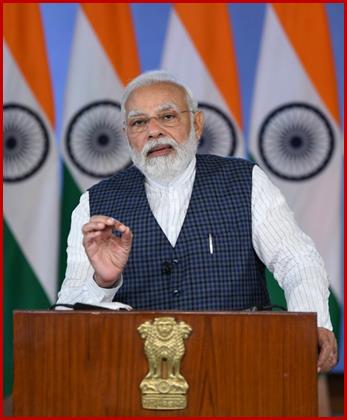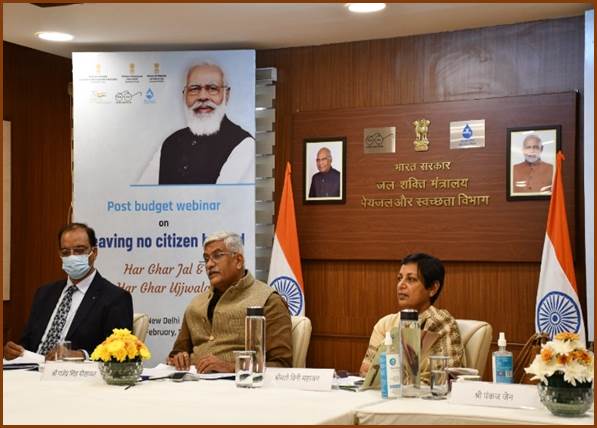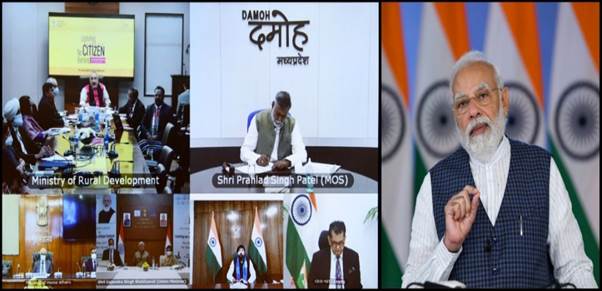Ministry of Jal Shakti
Prime Minister Stresses Upon Use Of Technology, Service Delivery & Community Participation To Achieve ‘Har Ghar Jal’ By 2024
Safe Drinking Water Has Far Reaching Health Impact With Reduced Incidence Of Water Borne Diseases - Union Jal Shakti Minister
Stakeholders Discuss Various Measures To Strengthen Rural Water Supply Structure Ensuring ‘Har Ghar Jal’
Posted On:
23 FEB 2022 8:06PM by PIB Delhi
“Develop strategy, use technology to monitor the progress and fix accountability as the country sets the goal to provide about 4 Crore tap water connections in rural household this year”, said Prime Minister, Shri Narendra Modi while addressing a webinar under the theme ‘Leaving no citizen behind’ efficient and effective implementation of on positive impact of Union Budget 2022 on water and sanitation held today.
Union Minister, Jal Shakti, Shri Gajendra Singh Shekhawat, Minister of State, Jal Shakti, Shri Prahlad Singh Patel, Minister of State, Jal Shakti Shri Bishweswar Tudu, Secretary, DDWS, Smt. Vini Mahajan, Addl. Secretary, DDWS, Shri Arun Baroka along with key stakeholders from WASH, UN agency, government officials, industry and technical experts from the domain, were present on the occasion. This series of webinar is a part of the new practice of discussion and dialogue with various stakeholders associated under the programme.
While addressing the webinar, the Prime Minister said, “a clear roadmap must be built so that States/ UTs can achieve the target within the stipulated timeframe. Priority should be given to North-Eastern border States, hilly region and aspirational districts.”
Prime Minister further stated, “Rural development should be put on the forefront and quality must be ensured. There is no dearth of funds to achieve the target of reaching every rural household with tap water connection by 2024.”

Click here to read the English rendering of PM’s address at webinar on positive impact of Union Budget on rural development (Insert link: https://www.pib.gov.in/PressReleasePage.aspx?PRID=1800489 )
The webinar was coordinated by Ministry of Rural Development in which ten different Ministries participated under the theme “Leaving No Citizen Behind”. The panelists for the breakout session on Har Ghar Jal and Har Ghar Ujjwala were Shri K. Asok Kumar, Executive VP & Head L&T, Shri Nicholas Osbert, Chief WASH UNICEF India, Shri G Mathi Vathnan, Principal Secretary, Housing and Urban Development Odisha, Shri Divanshu Kumar, CEO Solinas Integrity, Shri R. Mukundan, MD & CEO Tata Chemicals, Shri Girish Krishnamurthy, VP Tata Sons, Shri Rameshwar Rao, Engineering Staff College Hyderabad, Shri Amit Naphade Krushi Vikas v Gramin Prashikshan Sanstha Buldana, Dr Kamal Bahuguna, Himalayan Institute for Environment Dehradun, Shri Gopala Krishnan, Rtd Chief Engineer Coimbatore and Shri Shailesh Bagauli, Secretary Urban Development Uttarakhand. The session was moderated by Smt Vini Mahajan, Secretary, Drinking Water and Sanitation.

The breakout session on ‘Har Ghar Jal’ was chaired by the Union Minister Jal Shakti, Shri Gajendra Singh Shekhawat. Addressing the august gathering the Union Minister said, “Safe drinking water has far reaching health impacts with reduced incidences of water borne diseases. Dovetailing funds received from JJM, 15th Finance Commission, SBM, MGNREGA should be used for water source strengthening and ground water recharge.”
Shri Shekhawat further added, “Jal Jeevan Mission has considerably reduced the drudgery faced by women and young girls of fetching water from long distance. Today over 9 Crore households have been provided with tap water connection in a short span of 2½ years. 1.37 Crore households in aspirational districts have received tap water while 1.23 Crore households in JE-AES water quality affected region are getting access to clean tap water.”

Minister of State Jal Shakti, Shri Prahlad Singh Patel, speaking on the occasion said, “there is need to pick up speed so that the target set to reach every rural home by 2024 is achieved for which DPRs must be developed and approved in a time bound manner. Efforts should be made to prioritize work in water quality affected and SC/ST habitations ‘leaving no one behind’ no matter what socio-economic strata of the society they belong to. The tendering process in the government must be simplified so that no time is lost. Believing in transparency and accountability all information with regard to the progress under the programme can be viewed on the Dashboard.”
The Secretary, DDWS said that Rs 60,000 Crore has been allocated in the current financial year under the Union Budget. Har Ghar Jal plays an important role in ending the drudgery faced by women and young girls as they walk long distance in search of drinking water to meet the daily household needs. Healthy competition among the villages to become water secure must be encouraged.”
Shri K. Asok Kumar Exe VP & Head L&T said that ‘Har Ghar Jal’ is an ambitious scheme of the national government. While the country is close to provide 50% of its population with tap water connection, there is need to develop combined multi-village scheme and a single clearance widow which should include land acquisition from different departments.”
Shri Nicholas Osbert, WASH Chief UNICEF said, “‘Har Ghar Jal’ scheme shows the political will as big money is allocated for implementation of the scheme which in turn will globally encourage leaders to work on attaining the SDGs. Nearly 7.55 million micro jobs have been created which is crucial as the world was in the grip of three Covid waves. Safe and clean water has greatly improved the life of women and marginalized population with ‘ease of living’ with dignity.”
Shri Girish Krishnamurthy, VP Tata Sons spoke about the Mobile App developed by Jal Jeevan Mission, which goes a long way in digitally monitoring the programme by the various stakeholders. He added that Tata Group is supporting the government through its 15 pilot projects spread across 10 States in the country.
Shri Amit Naphade from Krushi Vikas v Gramin Prashikshan Sanstha Buldana shared his views on the importance of community engagement while developing the Village Action Plan. He said’ “A Jal Sakshar Mobile Application has been developed which is receiving good response from the ground level stakeholders. The groups formed during the training programme are sharing their experiences even post training and are supporting each other in finding solution to the problems they face on regular basis.”
Himalayan Institute for Environment Dehradun is engaged as Implementing Support Agency by Uttarakhand. Dr Kamal Bahuguna, from the institute shared his experience from the field on how baseline survey is being carried out by the Pani Samiti. Efforts are made to strengthen the existing water sources including the springs so that sustainability of the programme is ensured. People are contributing 5% of its funds in developing the infrastructure as per JJM guidelines.”
Smt Vini Mahajan, Secretary DDWS summarized the session and shared the key takeaways as highlighted by the different panelists. The discussion and suggestions from the session are true reflection of Prime Minister Shri Narendra Modi’s vision of “Sabka Saath, Sabka Vikas, Sabka Vishwas aur Sabka Prayas”. 100 districts, 1,144 blocks, 66,763 gram panchayats and 1,37,940 villages have become ‘Har Ghar Jal’. Three States – Goa, Telangana and Haryana and three UTs – A&N Islands, D&N Haveli & Daman & Diu and Puducherry have provided 100% tap water coverage. Other States are fast moving and are close to achieve the cent percent coverage shortly. Of these Punjab stands at 99%, Himachal Pradesh at 93%, Gujarat at 92% and Bihar at 90%. All these have set 2022 as the deadline to reach every rural home with tap water.
*******
BY/AS
(Release ID: 1800643)
Visitor Counter : 1120